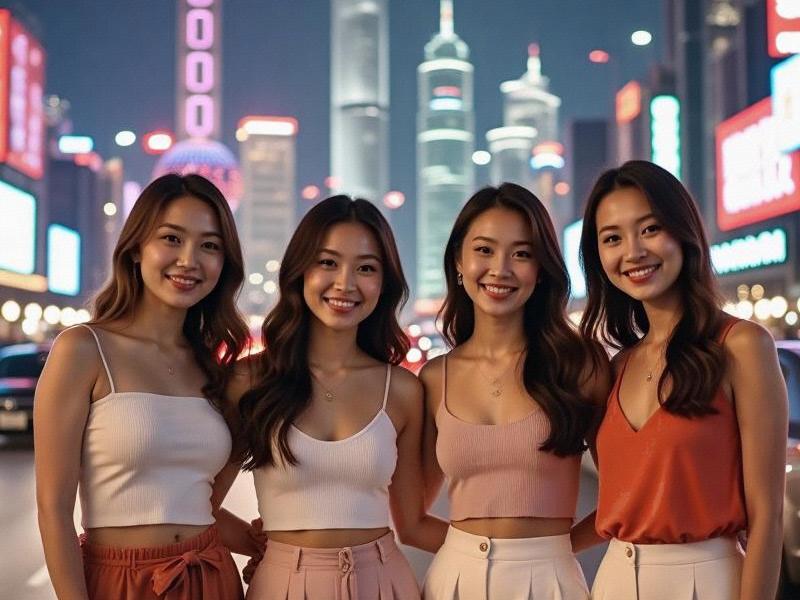
Neon Renaissance: Shanghai's Entertainment Clubs Navigate Post-Pandemic Transformation
Chapter 1: The Changing Face of Nightlife
Shanghai's entertainment club scene, once dominated by extravagant KTV palaces and exclusive members-only lounges, is undergoing its most significant transformation in decades. The pandemic accelerated changes that were already brewing in China's most cosmopolitan city, where entertainment venues have long served as crucial networking hubs for business and social elites.
The most visible shift is spatial. Formerly concentrated in districts like Huangpu and Jing'an, premium clubs are now decentralizing. New hotspots have emerged in Hongqiao's business district and along the Huangpu River's western bank. The 2023 opening of "Cloud Nine" in Xuhui set a new standard - a 12-story vertical entertainment complex combining private dining, immersive digital art exhibitions, and soundproofed karaoke pods with AI vocal enhancement technology.
Chapter 2: The New Business Entertainment Economy
爱上海同城419 Corporate entertainment budgets have changed, but not disappeared. While lavish spending on alcohol has decreased 38% since 2019 (Shanghai Commerce Commission data), experiential spending has increased. Venues like "The Treasury" in Pudong now offer curated cultural programs alongside traditional hospitality - clients might enjoy Peking opera performances before private karaoke sessions with blockchain-powered song selection systems.
Membership models have evolved too. The prestigious "Dragon Gate Club" has shifted from lifetime memberships (previously priced at ¥2.8 million) to flexible corporate packages that include cultural education credits. "We're selling sophistication, not just scotch," explains manager Vivian Wu.
Chapter 3: Technological Disruption
Smart entertainment has become the new battleground. Leading chains have invested heavily in contactless ordering systems and voice-controlled room environments. At "Echo Chamber," patrons use facial recognition to access personalized playlists synced from their music streaming accounts. The venue's AI mixologist can recrteeafavorite cocktails from memory after one visit.
上海龙凤419油压论坛 More radically, some clubs are experimenting with metaverse integrations. "MetaMansion" in Jing'an allows premium members to host hybrid physical-digital events, where avatar guests can interact through VR setups in private rooms. Though still niche, these innovations point to where the industry sees future growth.
Chapter 4: Regulatory Adaptation
Stricter regulations have forced creative adaptations. The 2024 "Healthy Nightlife" initiative banned certain late-night practices but also certified venues meeting new standards. Certified clubs like "Luminous" now display government-awarded QR codes at entrances, signaling compliance with fire safety, labor, and hygiene protocols.
Surprisingly, these changes have elevated standards. "The regulations wiped out shady operators, leaving more space for serious players," notes industry analyst Mark Li. Upscale venues now emphasize their legal status as competitive advantages.
上海夜生活论坛 Chapter 5: Cultural Rebranding
The most successful clubs are repositioning as cultural spaces. "Pearl Hall" near the Bund hosts weekly jazz history lectures alongside its music programming. "Golden Age" in Former French Conjunction curates rotating photography exhibits about Shanghai's entertainment history dating back to the 1930s.
This cultural pivot reflects changing consumer values. Younger patrons, especially the post-90s generation, seek authenticity and storytelling alongside entertainment. Venues that can blend Shanghai's rich nightlife heritage with contemporary experiences are thriving.
Looking Ahead
As Shanghai's entertainment industry approaches its post-pandemic equilibrium, a new paradigm emerges: less about conspicuous consumption, more about curated experiences; less about isolation, more about cultural connection. The neon lights still glow along Huaihai Road, but they now illuminate a more sophisticated, sustainable nightlife ecosystem that could set trends for all of urban China.
